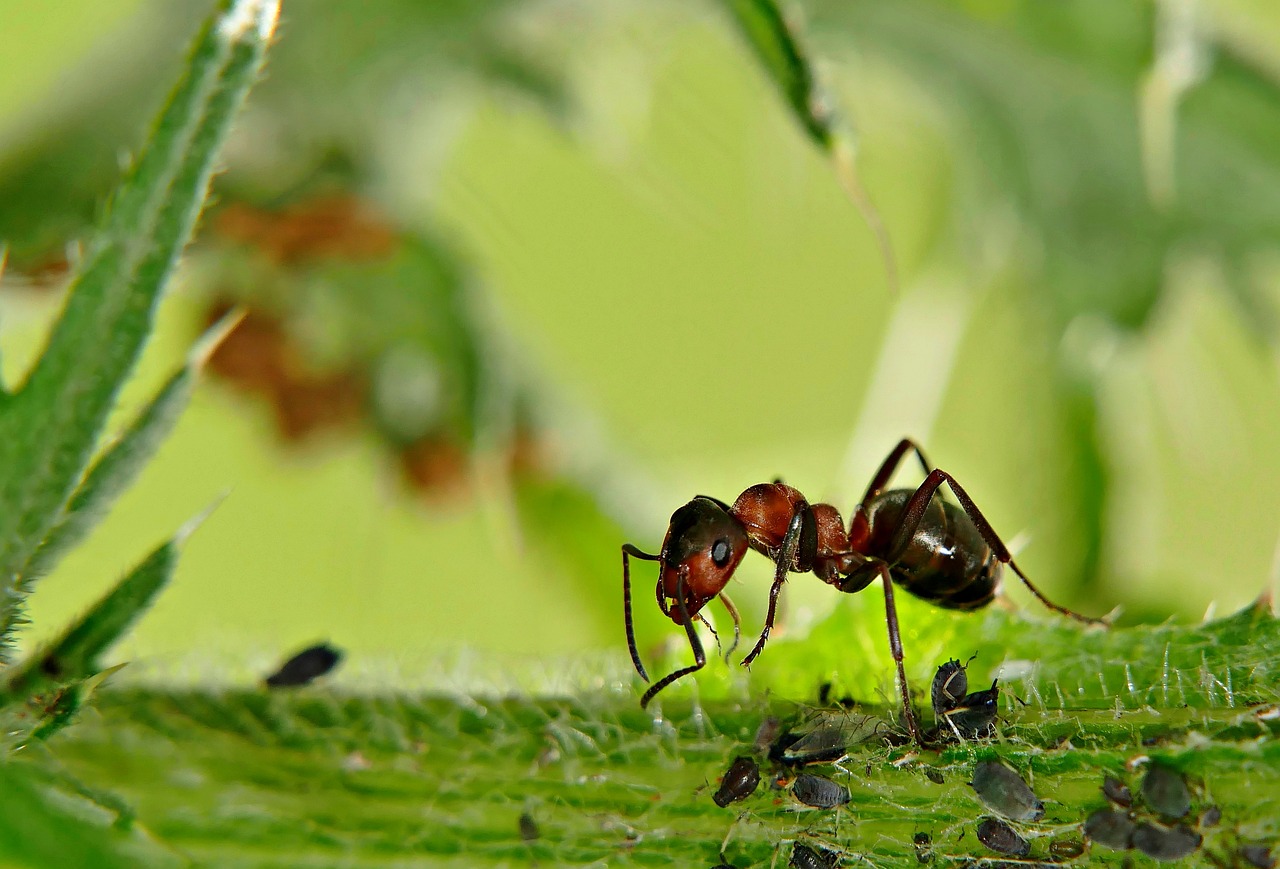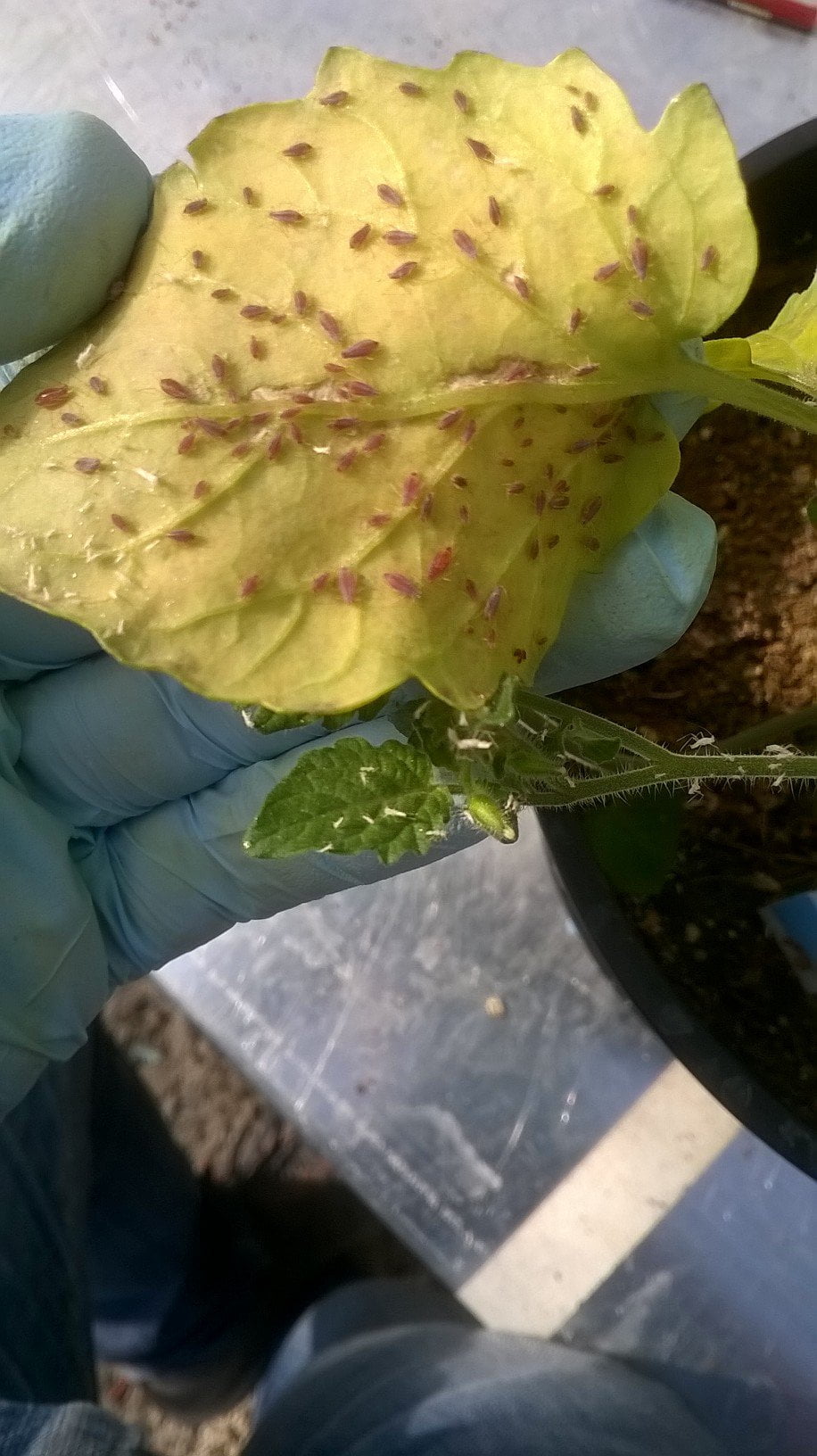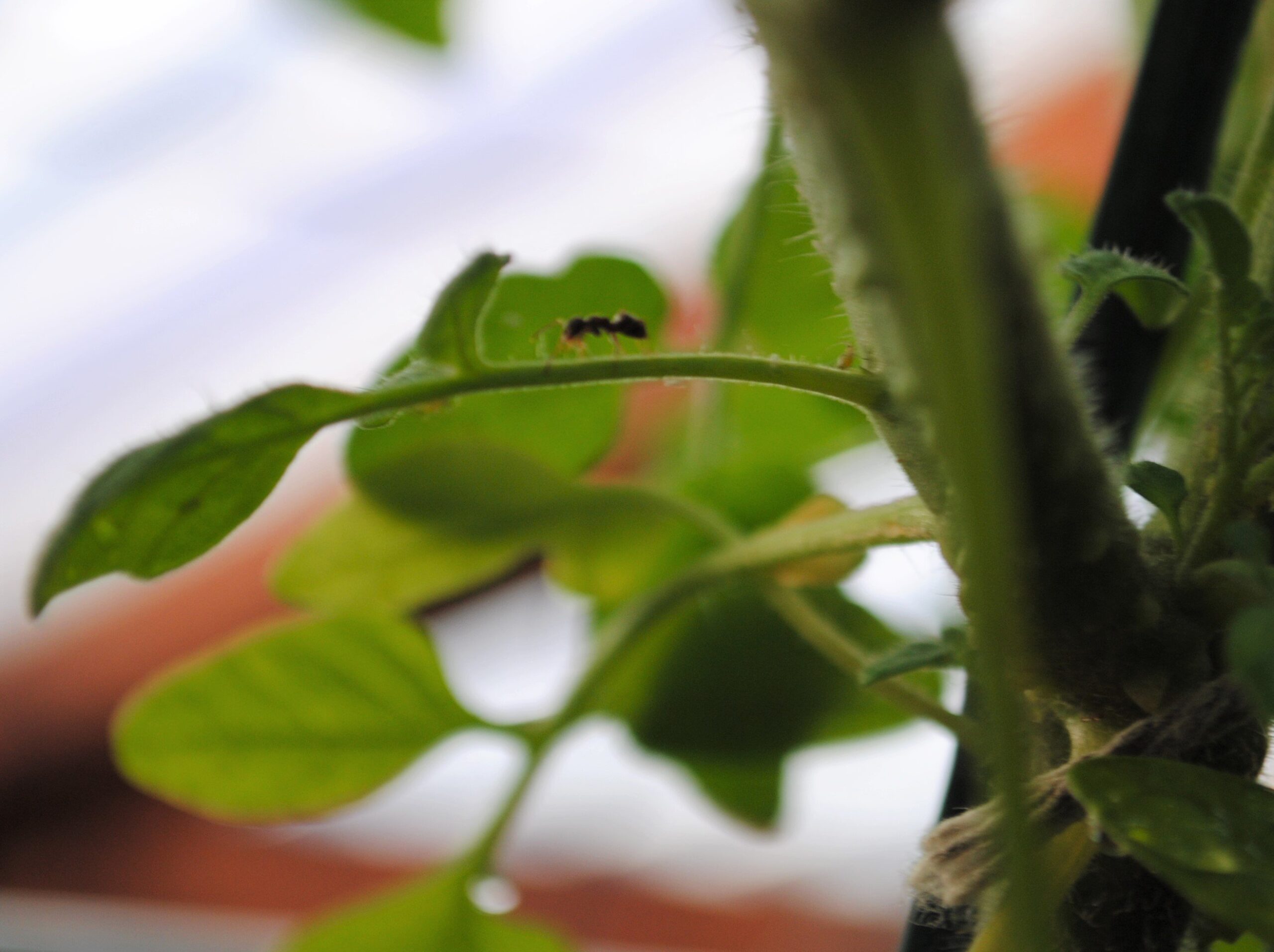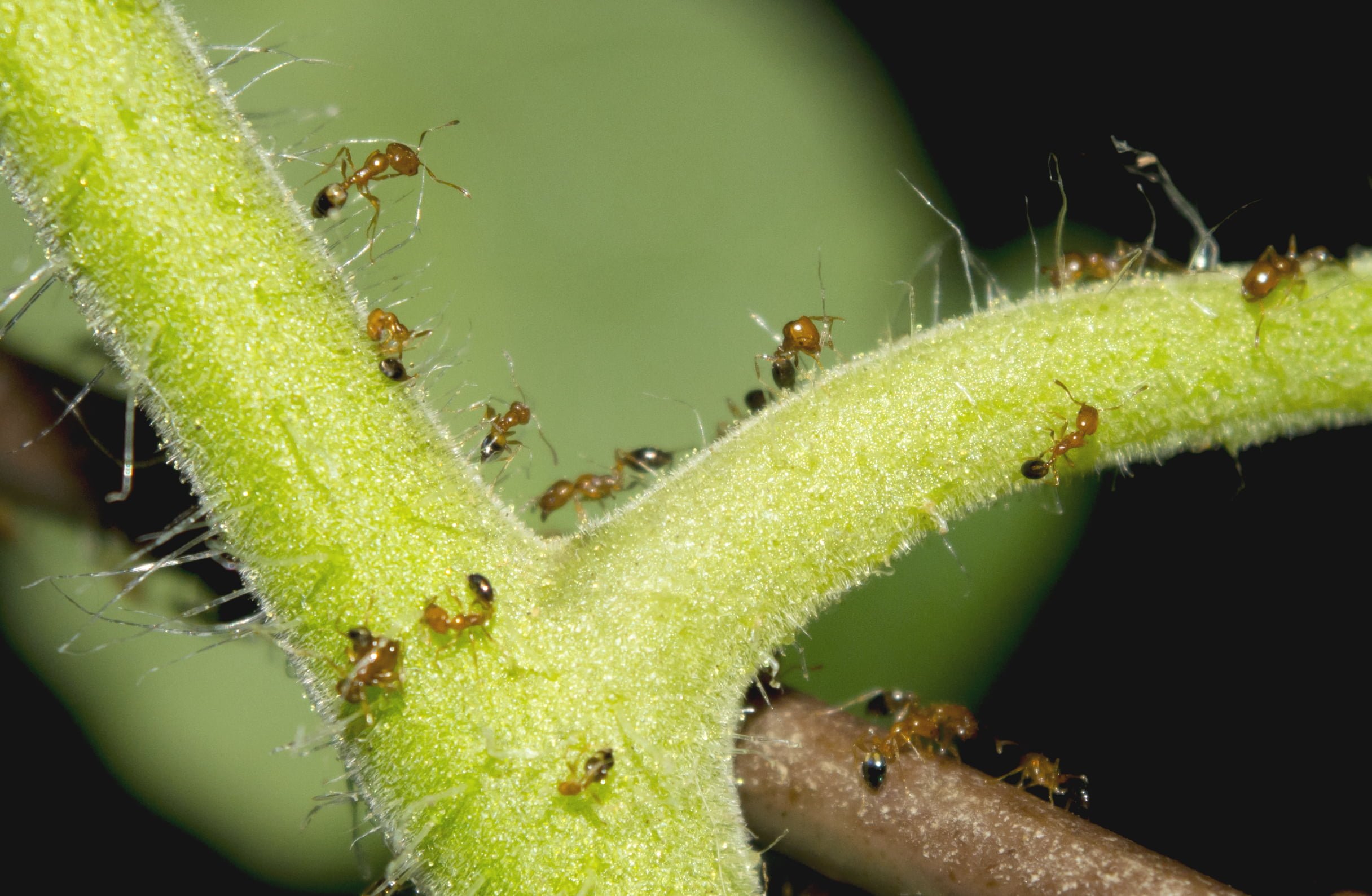
If you’ve ever cultivated tomatoes, you’re likely familiar with the sight of ants marching up and down your prized tomato plants. This peculiar phenomenon can leave gardeners puzzled and concerned. In this article, we will explore ten effective and natural methods to get rid of ants on tomato plants.
Table of Contents
Why Are Ants on Tomato Plants?
The Ants and Aphids Relationship
A common scenario in the garden is encountering ants swarming over your tomato plants. The primary reason behind this phenomenon is often an infestation of aphids. Aphids are tiny insects that feed on the sap of plants, including tomato plants. As they feed, aphids excrete a sugary substance called honeydew, which ants find irresistibly attractive.
The relationship between ants and aphids is one of mutualism, where both species benefit from their association. Ants feed on the honeydew produced by aphids and, in return, provide protection to the aphids from predators and parasites. They even transport aphids from one plant to another, ensuring a steady supply of honeydew. Thus, it’s not the ants causing the problem; it’s the aphids.
The Impact of Aphids on Tomato Plants

While ants themselves may not harm your tomato plants directly, the presence of aphids can have detrimental effects. Aphids pierce the plant’s tissues with their needle-like mouthparts, causing puncture wounds that serve as entry points for plant pathogens. The loss of sap due to aphid feeding can lead to wilting and yellowing of the leaves. Additionally, the honeydew excreted by aphids can promote the growth of sooty mold on the leaves, further harming the plant.
10 Ways to Get Rid of Ants on Your Tomato Plants

1. Ant Barriers
Creating ant barriers is a simple yet effective way to prevent ants from climbing the stems of your tomato plants and tending to their aphid partners. You can employ various materials for this purpose:
- Copper tape: Applying copper tape to the stem of your tomato plants creates a barrier that ants are reluctant to cross.
- Diatomaceous Earth (DE): DE is a natural powder that is abrasive to ants. Sprinkle it around the base of your tomato plants to deter ants, but use it cautiously to avoid harm to beneficial insects.
- Petroleum Jelly: Applying petroleum jelly to the base of tomato plants forms a barrier that ants find challenging to cross.
- Tanglefoot: This sticky material can be applied to the base of tomato plants, trapping ants and preventing them from reaching the aphids.
Remember to reapply these barriers after rain or when their effectiveness diminishes.
2. Borax Bait Traps
Borax bait traps are highly effective in controlling ants on tomato plants. These traps attract ants and, when ingested, transfer poison to the colony, ultimately killing the queen and other ants. Create a bait trap by mixing borax with water and placing it near your tomato plants. Borax will attract ants, while the poison eliminates them.
3. Citrus Peels
Surprisingly, citrus peels, such as those from grapefruits, lemons, and oranges, can help repel ants from your tomato plants. Place the peels around the base of your plants to disrupt ant pheromone trails. While this is a temporary solution, it can deter ants temporarily.
4. Companion Planting
Companion planting involves strategically growing certain plants near your tomatoes to provide mutual benefits. Some companion plants that repel ants and aphids include:
- Basil: Its strong scent is unappealing to aphids and ants.
- Garlic: Known for its strong odor, garlic can repel aphids and ants.
- Catnip: Repels aphids and ants while attracting beneficial insects.
- Chives: Their strong odor can deter aphids and ants.
- Dill: Acts as a natural repellent for aphids.
- Marigold: Repels aphids and inhibits the growth of nematodes.
While companion planting isn’t foolproof, it can be used in conjunction with other methods for better results.
5. Insecticidal Soap
Insecticidal soap is a potent tool for eliminating aphids on tomato plants. You can purchase it or make your own by mixing liquid soap with water. Apply the solution to the leaves and stems of your tomato plants, ensuring thorough coverage. This method can also help control ants.
6. Ant Mound Drench
The mound drench method, popularized by the Dirt Doctor, involves pouring a mixture of compost tea, molasses, and orange oil over ant mounds found in your garden. This method is effective at eliminating ants without harming your plants.
7. Neem Oil
Cold-pressed neem oil, derived from neem trees, is a powerful insecticide. It disrupts the biological systems of pests, including ants. Neem oil can be applied directly to ant mounds or as a soil drench to deter ants and aphids.
8. Orange Oil
Orange oil, available as a spray, is an excellent deterrent for ants. It can be applied directly to ants when spotted on your tomato plants. For a cost-effective solution, mix orange oil with water and castile liquid soap, then spray it around your plants.
9. Vinegar and Water
A mixture of distilled white vinegar and water can help erase ant pheromone trails. Spray this solution on or near ants to disrupt their communication. This method is best used in combination with other strategies for lasting results.
10. Water Blast
For small aphid infestations, a strong jet of water can dislodge aphids and ants from your plants. Be cautious not to damage the plants while doing so. This method is most effective for minor infestations.
Do Ants Eat Tomatoes?
You might be wondering if ants are devouring your precious tomatoes. Fortunately, ants typically do not eat tomatoes as they do not provide significant nutrition for them. Instead, they are attracted to the sweet honeydew excreted by aphids. If you observe numerous ants on your tomato plants, investigate beneath them with a magnifying glass to locate the aphids.
Will Ants Harm My Tomato Plants?
In general, ants are more beneficial than harmful in your garden. They play a crucial role in the ecosystem by scavenging dead insects, tilling the soil, and protecting plants from certain pests. However, excessive soil disturbance caused by ants tunneling can be detrimental to young tomato plants. With the exception of leafcutter and red fire ants, ants do not directly harm tomato plants.
Conclusion
Understanding the intricate relationship between ants, aphids, and tomato plants is essential for effective pest management. While ants themselves are not the problem, their presence often signifies an aphid infestation that can harm your tomatoes. By employing a combination of natural solutions, such as ant barriers, bait traps, and companion planting, you can protect your tomato plants and ensure a bountiful harvest. With the right strategies in place, you can enjoy healthy, pest-free tomato plants in your garden.

